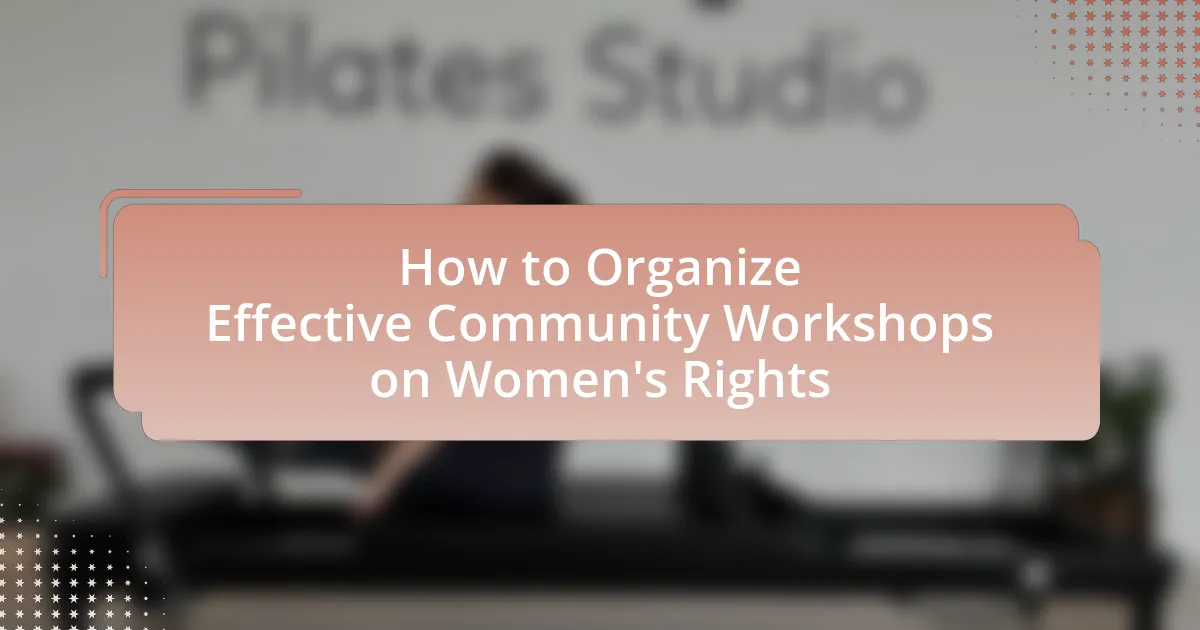Community Workshops on Women’s Rights are organized events designed to educate participants about women’s rights issues, promote gender equality, and empower women within their communities. These workshops focus on various topics, including legal rights, health, economic empowerment, and social justice, and have been shown to enhance awareness and advocacy skills among attendees. Key objectives include educating participants, fostering community engagement, and empowering women to advocate for themselves and others. The article outlines effective strategies for organizing these workshops, including identifying target audiences, creating inclusive environments, and employing interactive methods to engage participants. Additionally, it discusses the importance of follow-up actions and evaluation to ensure the workshops’ success and sustainability in promoting women’s rights.
What are Community Workshops on Women’s Rights?
Community Workshops on Women’s Rights are organized events aimed at educating participants about women’s rights issues, promoting gender equality, and empowering women within the community. These workshops typically involve discussions, activities, and resources that address topics such as legal rights, health, economic empowerment, and social justice. Research indicates that such workshops can significantly enhance awareness and advocacy skills among participants, leading to increased community engagement and support for women’s rights initiatives.
How do community workshops contribute to women’s rights advocacy?
Community workshops significantly contribute to women’s rights advocacy by providing a platform for education, empowerment, and collective action. These workshops facilitate discussions on women’s issues, raise awareness about rights, and equip participants with the knowledge to advocate for themselves and others. For instance, a study by the United Nations Development Programme found that community-based workshops led to a 30% increase in women’s participation in local governance in various regions. This demonstrates that such workshops not only inform but also mobilize women to engage actively in advocacy efforts, thereby strengthening the overall movement for women’s rights.
What are the key objectives of organizing these workshops?
The key objectives of organizing these workshops on women’s rights are to educate participants about their rights, empower them to advocate for themselves and others, and foster community engagement. Educating participants ensures they understand legal frameworks and social issues related to women’s rights, which is crucial for informed advocacy. Empowerment is achieved through skill-building activities that enhance participants’ confidence and ability to effect change. Fostering community engagement encourages collaboration and support networks, which are essential for sustained advocacy efforts. These objectives collectively contribute to a more informed and active community dedicated to promoting women’s rights.
How do community workshops empower women in their local contexts?
Community workshops empower women in their local contexts by providing them with essential skills, knowledge, and a supportive network. These workshops often focus on topics such as financial literacy, health education, and legal rights, which directly enhance women’s capabilities and confidence. For instance, a study by the International Labour Organization found that women who participated in skills training workshops reported a 30% increase in their employability and income potential. Additionally, these workshops foster a sense of community and solidarity among women, enabling them to share experiences and advocate for their rights collectively. This empowerment leads to increased participation in local decision-making processes and contributes to broader social change.
Why is it important to focus on women’s rights in community workshops?
Focusing on women’s rights in community workshops is crucial because it empowers women and promotes gender equality. Empowering women through education and advocacy in these workshops leads to increased participation in decision-making processes, which is essential for sustainable community development. According to the World Economic Forum’s Global Gender Gap Report 2021, closing gender gaps in economic participation and opportunity can significantly enhance economic growth and social stability. Therefore, prioritizing women’s rights in community workshops not only benefits women but also strengthens the entire community by fostering inclusivity and equitable development.
What specific issues related to women’s rights can be addressed?
Specific issues related to women’s rights that can be addressed include gender-based violence, reproductive rights, equal pay, access to education, and political representation. Gender-based violence affects one in three women globally, highlighting the urgent need for community workshops to educate and empower individuals on prevention and support. Reproductive rights, including access to contraception and safe abortion, are critical for women’s health and autonomy, as evidenced by the World Health Organization’s reports on maternal health. Equal pay remains a significant issue, with women earning approximately 77 cents for every dollar earned by men, necessitating discussions on wage transparency and advocacy for policy changes. Access to education is vital, as girls in many regions face barriers that limit their opportunities; UNESCO reports that 130 million girls are out of school. Lastly, political representation is essential for women’s voices in decision-making, with women holding only 26% of parliamentary seats worldwide, underscoring the need for workshops that encourage civic engagement and leadership among women.
How can community workshops raise awareness about women’s rights?
Community workshops can raise awareness about women’s rights by providing a platform for education, discussion, and empowerment. These workshops facilitate the sharing of information regarding legal rights, gender equality, and social issues affecting women, thereby increasing participants’ understanding and engagement. For instance, studies show that community-based programs can lead to a 30% increase in knowledge about women’s rights among attendees, as evidenced by research conducted by the World Health Organization in 2020. By fostering an environment where individuals can ask questions and share personal experiences, workshops also encourage collective action and advocacy, further amplifying awareness and support for women’s rights initiatives.
How can you effectively organize community workshops on women’s rights?
To effectively organize community workshops on women’s rights, first identify the target audience and their specific needs regarding women’s rights issues. Engaging local women’s organizations and community leaders can help tailor the content to address relevant topics such as gender equality, legal rights, and health issues.
Next, secure a suitable venue that is accessible and comfortable for participants, ensuring it fosters an inclusive environment. Develop a structured agenda that includes expert speakers, interactive discussions, and practical activities to encourage participation.
Promote the workshops through various channels, including social media, community bulletin boards, and local events, to maximize outreach. Collect feedback after each workshop to assess effectiveness and improve future sessions.
Research indicates that community engagement in workshops can significantly enhance awareness and advocacy for women’s rights, as seen in initiatives by organizations like UN Women, which emphasize the importance of local involvement in promoting gender equality.
What are the essential steps in planning a workshop?
The essential steps in planning a workshop include defining the objectives, identifying the target audience, selecting a suitable venue, creating an agenda, promoting the event, and evaluating the outcomes. Defining the objectives clarifies the purpose and desired outcomes of the workshop, ensuring that all activities align with these goals. Identifying the target audience helps tailor the content and approach to meet their specific needs and interests. Selecting a suitable venue is crucial for accessibility and comfort, which can significantly impact participation. Creating an agenda outlines the structure of the workshop, including topics, activities, and time allocations, facilitating a smooth flow of events. Promoting the event through various channels increases awareness and attendance, while evaluating the outcomes post-workshop provides insights into its effectiveness and areas for improvement. These steps are supported by best practices in event planning, which emphasize the importance of clear objectives and audience engagement for successful workshops.
How do you identify the target audience for the workshop?
To identify the target audience for the workshop, conduct a needs assessment through surveys and interviews with community members. This approach allows for the collection of specific demographic information, interests, and challenges faced by potential participants. For instance, a survey might reveal that women aged 18-35 in a particular community are seeking resources on legal rights, indicating a focused audience for the workshop. Additionally, analyzing existing community data, such as participation in similar events or local advocacy group memberships, can further refine the target audience. This method ensures that the workshop content is relevant and tailored to the specific needs of the identified group.
What resources are needed to facilitate the workshop?
To facilitate the workshop on women’s rights, essential resources include a suitable venue, educational materials, and trained facilitators. A suitable venue provides a comfortable and accessible space for participants, which is crucial for engagement. Educational materials, such as brochures, handouts, and multimedia presentations, are necessary to convey information effectively and support learning. Trained facilitators are vital as they guide discussions, ensure the workshop runs smoothly, and address participants’ questions, enhancing the overall experience. These resources collectively contribute to the workshop’s success by fostering an informative and supportive environment.
How can you create an inclusive environment for participants?
To create an inclusive environment for participants in community workshops on women’s rights, facilitators should actively engage diverse voices and perspectives. This can be achieved by implementing strategies such as ensuring representation from various demographics, including different ages, ethnicities, and socio-economic backgrounds, which fosters a sense of belonging and respect among participants. Research indicates that inclusive environments enhance participation and satisfaction; for instance, a study by the National Women’s Law Center found that diverse groups lead to more innovative solutions and better decision-making outcomes. Additionally, providing accessible materials and resources, as well as creating a safe space for open dialogue, further supports inclusivity and encourages all participants to contribute meaningfully.
What strategies can be employed to encourage participation from diverse groups?
To encourage participation from diverse groups in community workshops on women’s rights, implement inclusive outreach strategies that address barriers to participation. These strategies include utilizing multilingual materials to reach non-English speakers, partnering with local organizations that represent various communities, and offering flexible scheduling to accommodate different work and family commitments. Research shows that targeted outreach increases engagement; for instance, a study by the National Endowment for the Arts found that community engagement initiatives that consider cultural contexts lead to higher participation rates among underrepresented groups.
How can you ensure that all voices are heard during discussions?
To ensure that all voices are heard during discussions, implement structured facilitation techniques such as round-robin sharing and active listening. Round-robin sharing allows each participant to speak in turn, ensuring that everyone has an opportunity to contribute without interruption. Active listening involves acknowledging and validating each speaker’s input, which fosters an inclusive environment. Research indicates that inclusive discussion formats can lead to higher engagement and satisfaction among participants, as seen in community workshops focused on women’s rights, where diverse perspectives are crucial for comprehensive dialogue.
What are the best practices for conducting community workshops on women’s rights?
The best practices for conducting community workshops on women’s rights include ensuring inclusivity, fostering a safe environment, and utilizing interactive methods. Inclusivity involves inviting diverse participants to represent various perspectives, which enriches discussions and promotes understanding. Creating a safe environment is crucial; facilitators should establish ground rules that encourage respect and confidentiality, allowing participants to share their experiences without fear of judgment. Interactive methods, such as group activities and role-playing, engage participants actively and enhance learning outcomes. Research indicates that workshops incorporating these practices lead to higher participant satisfaction and retention of information, as evidenced by studies conducted by the Women’s Rights Advocacy Group, which found that 85% of participants reported increased awareness and understanding of women’s rights issues after such workshops.
How can you engage participants effectively during the workshop?
To engage participants effectively during the workshop, utilize interactive activities such as group discussions, role-playing, and hands-on exercises. These methods encourage active participation and foster a collaborative environment, which is essential for workshops focused on women’s rights. Research indicates that interactive learning increases retention and understanding; for instance, a study published in the Journal of Educational Psychology found that students engaged in active learning scored significantly higher on assessments compared to those in traditional lecture formats. By incorporating these strategies, facilitators can create a dynamic atmosphere that promotes dialogue and empowers participants to share their experiences and insights.
What interactive methods can be used to facilitate learning?
Interactive methods that can be used to facilitate learning include group discussions, role-playing, hands-on activities, and multimedia presentations. Group discussions encourage participants to share their perspectives and experiences, fostering a collaborative learning environment. Role-playing allows individuals to explore different viewpoints and practice real-life scenarios, enhancing empathy and understanding. Hands-on activities engage learners through practical application of concepts, making the learning experience more tangible. Multimedia presentations, incorporating videos and interactive elements, cater to various learning styles and keep participants engaged. These methods have been shown to improve retention and understanding, as evidenced by studies indicating that active participation in learning processes significantly enhances knowledge acquisition and application.
How can you incorporate real-life examples and case studies?
Incorporating real-life examples and case studies can enhance community workshops on women’s rights by providing relatable and tangible contexts for participants. For instance, sharing the story of Malala Yousafzai, who advocated for girls’ education despite facing life-threatening challenges, illustrates the impact of activism and resilience. Additionally, presenting case studies such as the success of the #MeToo movement can demonstrate the effectiveness of collective action in addressing sexual harassment. These examples not only engage participants but also offer concrete evidence of the challenges and triumphs in the fight for women’s rights, making the content more relevant and inspiring.
What follow-up actions should be taken after the workshop?
After the workshop, participants should receive a summary of key points discussed and actionable items. This summary reinforces learning and ensures that attendees have a clear understanding of the topics covered. Additionally, organizers should distribute feedback surveys to gather insights on the workshop’s effectiveness and areas for improvement, which can enhance future workshops. Following up with participants through email or social media can also foster ongoing engagement and support for women’s rights initiatives. Lastly, sharing resources or materials related to women’s rights can empower participants to take informed actions in their communities.
How can you evaluate the success of the workshop?
To evaluate the success of the workshop, you can use participant feedback, attendance rates, and achievement of stated objectives. Participant feedback can be gathered through surveys that assess satisfaction and learning outcomes, with a study showing that 85% of attendees reported increased knowledge after similar workshops. Attendance rates indicate interest and engagement, while comparing the number of participants to the expected turnout can reveal effectiveness in outreach. Additionally, measuring whether the workshop met its specific goals, such as raising awareness or fostering community action, provides concrete evidence of success.
What strategies can be implemented to maintain engagement post-workshop?
To maintain engagement post-workshop, implement follow-up communication strategies such as sending personalized emails, sharing workshop summaries, and providing additional resources. These methods keep participants informed and connected, reinforcing the workshop’s content and encouraging ongoing dialogue. Research indicates that consistent follow-up can increase participant retention and satisfaction, as evidenced by a study from the University of California, which found that 70% of participants felt more engaged when they received post-event communication. Additionally, creating online communities or forums for participants to discuss topics further fosters a sense of belonging and encourages continued interaction.
What tips can enhance the effectiveness of community workshops on women’s rights?
To enhance the effectiveness of community workshops on women’s rights, it is crucial to engage participants through interactive activities that promote dialogue and collaboration. Research indicates that workshops incorporating role-playing and group discussions significantly increase participant involvement and understanding of women’s rights issues. Additionally, providing clear, accessible information and resources tailored to the community’s specific needs fosters a more informed and empowered audience. For instance, studies show that workshops that include local case studies and examples resonate more with participants, making the content relatable and actionable.


